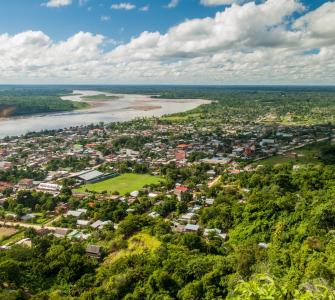In addition to grappling with one of the worst epidemics in recent history, Bolivia is currently facing ongoing economic and environmental challenges, which will make the path towards sustainable development that much harder. Updating Bolivia’s Nationally Determined Contributions (NDCs), or national plans, policies, and measures that address climate change under the Paris Climate Agreement is a critical step in the process of simultaneously advancing climate action, strengthening government institutions, addressing social inequality, and implementing economic measures that improve the efficiency of national development. Countries must update their NDCs every five years to the United Nations Framework Convention on Climate Change (UNFCCC) secretariat with increasingly ambitious climate goals and targets.
Conservation Strategy Fund (CSF) analyzed Bolivia's NDCs through a collaboration with academia, civil society, and the public sector with the ultimate goal of reducing CO2 emissions by 50% by 2030. Through this partnership, CSF completed the analysis "Economic Impact of Bolivia's NDC Mitigation Measures”, published in the Latin American Journal of Economic Development (LAJED), in which it estimated the total capital costs (CAPEX) and operating costs (OPEX) of a set of measures included in Bolivia’s updated NDCs, as well as the mitigation capacities of each of these.
Results show that implementing the measures to get to Bolivia’s 2050 goals will cost approximately 30% of the GDP in Net Present Value, or about 15.5 million USD. It also shows that the sector that has more capacity of offsetting GHG emissions is the Land Use, Land Use Change, and Forestry sector. This analysis also provides a baseline business as usual (BAU) scenario and compares it to a hypothetical scenario, modeled by our economists, to get an idea of how Bolivia’s economy would function on a 2050 timeline. In this way, we can get a sense of how Bolivia’s NDC measures can impact both the economy and emissions considering a scenario in which Bolivia applies its measures, versus a scenario in which it doesn’t.
This project was supported by the Swedish International Development Cooperation Agency (Sida) and implemented in partnership with the Latin American Center for Economic and Social Policy of the Pontifical Catholic University of Chile (Centro Latinoamericano de Políticas Económicas y Sociales de la Pontificia Universidad Católica de Chile, CLAPES UC) and the Plurinational Authority of Mother Earth (la Autoridad Plurinacional de la Madre Tierra, APMT).
Photo: Aerial view of Rurrenabaque, Bolivia
Photo Credit: Matyas Rehak/ Shutterstock.com

